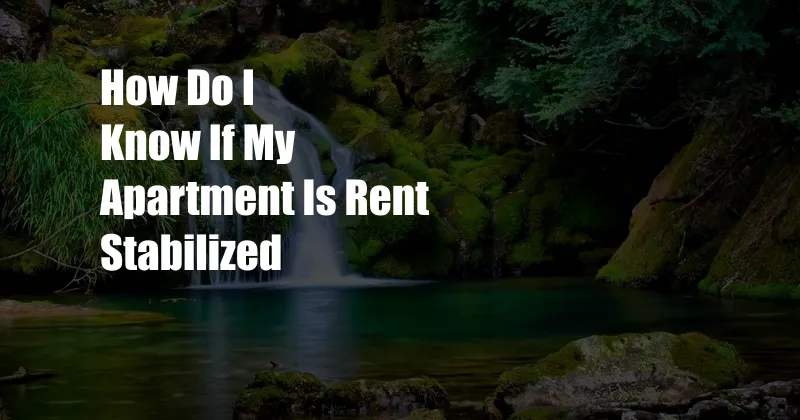
How to Determine Rent Stabilization Status for Your Apartment
Stepping into the world of apartment hunting can be an overwhelming adventure. One crucial aspect to consider, especially in bustling metropolitan areas, is rent stabilization. This protective measure safeguards tenants from soaring rent increases and unnecessary displacement. Understanding your apartment’s rent stabilization status will empower you to make informed housing decisions.
Let me share a personal story that ignited my curiosity about rent stabilization. Years ago, my friend’s rent skyrocketed after her landlord decided to renovate her cozy abode. She was heartbroken at the prospect of losing her beloved neighborhood. A little research later, we discovered that her apartment was rent-stabilized, protecting her from excessive rent hikes. This revelation sparked a quest to unravel the intricacies of rent stabilization and share this knowledge with fellow renters.
What is Rent Stabilization?
Rent stabilization is a form of government regulation that limits the amount landlords can increase rent for certain apartments. It aims to preserve affordable housing and prevent the displacement of low and moderate-income tenants. Rent-stabilized apartments are typically older buildings that have been subject to stabilization laws for several decades.
How Does Rent Stabilization Work?
Rent-stabilized apartments are subject to specific rules and regulations. The Rent Guidelines Board (RGB) sets annual percentage rent increase guidelines for these apartments. Landlords can only raise rent within these limits, which are typically below the market rate increases in unregulated apartments.
Benefits of Rent Stabilization
As a tenant in a rent-stabilized apartment, you enjoy several benefits:
- Protection from Excessive Rent Increases: Your rent increases will be limited by the RGB’s guidelines, providing you with stability in your housing expenses.
- Tenant Protections: Rent stabilization laws also provide tenants with protections against harassment, eviction without just cause, and improper living conditions.
How to Check If Your Apartment is Rent-Stabilized
There are a few ways to determine if your apartment is rent-stabilized:
- Check Your Lease: Most rent-stabilized leases will state that the apartment is subject to rent stabilization.
- Look for a Certificate of Rent Stabilization: Landlords are required to post a Certificate of Rent Stabilization in each rent-stabilized unit.
- Contact Your Local Rent Stabilization Office: You can contact the rent stabilization office in your city or town to check the status of your apartment.
Latest Trends in Rent Stabilization
Rent stabilization policies continue to evolve, driven by rising housing costs and gentrification. Some cities are exploring stricter rent stabilization laws to protect tenants from displacement. Others are considering expanding rent stabilization to include more apartments.
Tips from a Seasoned Blogger
Based on my experience as a blogger covering housing issues, I’ve gathered some valuable tips for tenants:
- Stay Informed: Make sure you’re aware of the rent stabilization laws in your area and your rights as a tenant.
- Keep Records: Document all communications with your landlord, including rent payments, maintenance requests, and notices.
- Seek Legal Help: If you’re having problems with your landlord, don’t hesitate to seek legal advice from a housing attorney.
Frequently Asked Questions
Here are answers to some common questions about rent stabilization:
- Q: What are the grounds for a landlord to evict a tenant in a rent-stabilized apartment?
A: Landlords can only evict rent-stabilized tenants for specific reasons, such as nonpayment of rent, lease violations, or building renovations. - Q: Can a landlord raise my rent more than the RGB guidelines?
A: No, landlords cannot raise rent beyond the limits set by the Rent Guidelines Board. - Q: What should I do if my landlord violates rent stabilization rules?
A: You should contact your local rent stabilization office or a housing attorney to report the violation.
Conclusion
Understanding your apartment’s rent stabilization status is crucial for making informed housing decisions. By leveraging the protections it offers, you can safeguard yourself from excessive rent increases and enjoy a more stable housing situation. If you have further questions, don’t hesitate to reach out to your local rent stabilization office or a housing attorney.
Are you interested in learning more about rent stabilization or other housing-related topics? Let me know in the comments below!